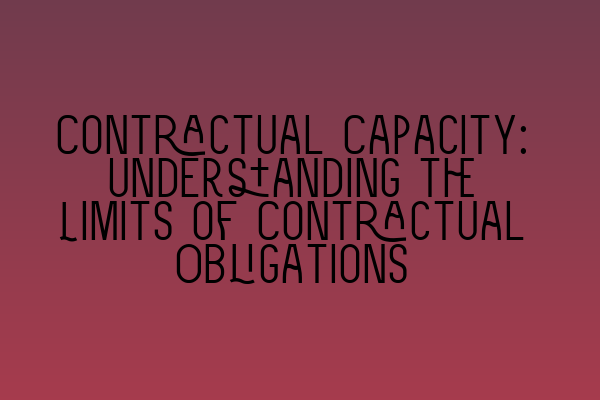Contractual Capacity: Understanding the Limits of Contractual Obligations
Contracts are the backbone of business and personal relationships. They are legally binding agreements that outline the rights and obligations of the parties involved. However, for a contract to be enforceable, the parties must have the necessary contractual capacity. In this article, we will delve into the concept of contractual capacity, its importance, and the limits it imposes on contractual obligations.
What is Contractual Capacity?
Contractual capacity refers to the legal ability of a person to enter into a contract and be bound by its terms. Not everyone has the same capacity to contract, and the law recognizes certain limitations based on various factors such as age, mental capacity, and intoxication.
Let’s take a closer look at some of the key factors that affect contractual capacity:
1. Age
The law recognizes that individuals below a certain age may lack the necessary understanding and judgment to enter into binding agreements. In most jurisdictions, the age of majority is 18, and individuals below this age are generally considered minors. Minors have limited contractual capacity, and their contracts are often voidable.
It’s important to note that some contracts, such as contracts for necessities (e.g., food, clothing, shelter), may be enforceable against minors. However, the specific rules surrounding contracts with minors vary from jurisdiction to jurisdiction, so it’s crucial to consult with a legal professional to understand the applicable laws in your area.
2. Mental Capacity
An individual must have the mental capacity to understand the nature and consequences of a contract in order for it to be legally binding. If a person lacks the mental capacity due to reasons such as mental illness, intellectual disability, or intoxication, the contract may be voidable.
It’s important to ensure that all parties involved in a contract have the necessary mental capacity. If there are concerns about the mental capacity of a party, seeking legal advice is advisable to avoid potential challenges or disputes down the line.
3. Intoxication
Contracts entered into while under the influence of drugs, alcohol, or other substances may be voidable. Intoxication impairs a person’s judgment and ability to understand and consent to the terms of a contract.
It’s worth noting that the laws regarding intoxicated individuals’ contractual capacity can be complex and vary between jurisdictions. If you suspect that a contract was entered into while under the influence, consulting with a solicitor can help you understand your options and potential legal remedies.
The Importance of Contractual Capacity
Contractual capacity serves several essential purposes:
1. Protecting Vulnerable Individuals
Laws surrounding contractual capacity exist to safeguard individuals who may be more susceptible to exploitation or making ill-informed decisions. These individuals often include minors, those with mental disabilities, or individuals who are intoxicated.
By limiting the contractual capacity of these individuals, the law provides a safety net that prevents them from being taken advantage of or entering into agreements that they may not fully understand or benefit from.
2. Ensuring Fairness and Equity
Contractual capacity also fosters fairness and equity in contractual relationships. It ensures that all parties have the necessary understanding and consent to enter into a contract freely and willingly.
By setting limits on contractual capacity, the law aims to prevent unfair or unjust contracts that may be the result of manipulation, coercion, or undue influence.
The Limits of Contractual Capacity
While contractual capacity is necessary for a contract to be enforceable, it has its limitations. Here are a few instances where contractual capacity may be limited or vary:
1. Mentally Incapacitated Individuals
Individuals with severe mental illnesses or intellectual disabilities may lack the capacity to enter into contracts. In such cases, a guardian or attorney may be appointed to make decisions on their behalf.
It’s important to be aware of the legal requirements and procedures involved when dealing with individuals who may lack mental capacity. Seeking legal advice can help ensure that the necessary steps are taken to protect both parties’ interests and comply with legal obligations.
2. Minors’ Contracts
As mentioned earlier, contracts made with minors are generally voidable. However, minors may still be held liable for contracts for necessaries or contracts deemed beneficial to them.
If you are considering entering into a contract with a minor or have concerns about a contract involving a minor, consulting with a solicitor can provide guidance on the specific rules and circumstances that may affect the enforceability of such contracts.
3. Professional Advice
Under certain circumstances, individuals may enter into contracts under the guidance and advice of professionals, such as solicitors or financial advisors. In such cases, the professional’s expertise may be deemed to compensate for any limited contractual capacity the individual may have.
It’s crucial to seek professional advice and ensure that the necessary legal requirements are met when relying on the guidance of professionals in contractual matters.
Conclusion
Contractual capacity is a fundamental aspect of contract law that enforces fairness, protects vulnerable individuals, and ensures the integrity of contractual agreements. Understanding the limits and factors that influence contractual capacity is crucial to create valid and enforceable contracts while complying with legal obligations.
To learn more about the legal profession, mentorship programs for aspiring solicitors, or other legal topics, check out the following related articles:
- Mentorship for Aspiring Solicitors: Nurturing Talent in the Legal Field
- Legal Challenges and Pitfalls: Navigating the Complexities of the Legal System
- Demystifying the Solicitors Qualifying Examination (SQE): What You Need to Know
- Embracing Diversity: Advancing Inclusivity in the Legal Profession
- Recognizing Excellence: Law Industry Awards and Accolades
